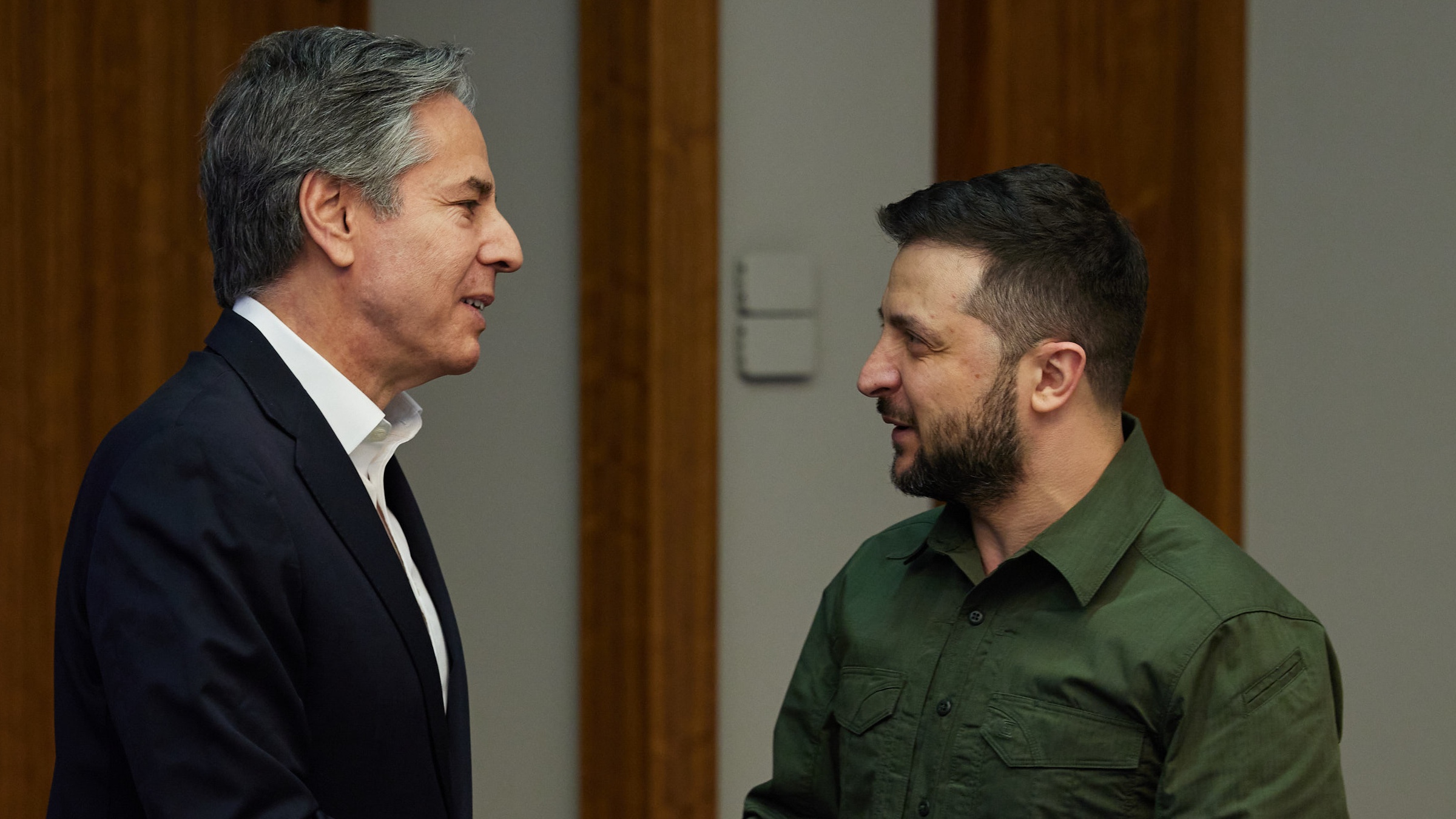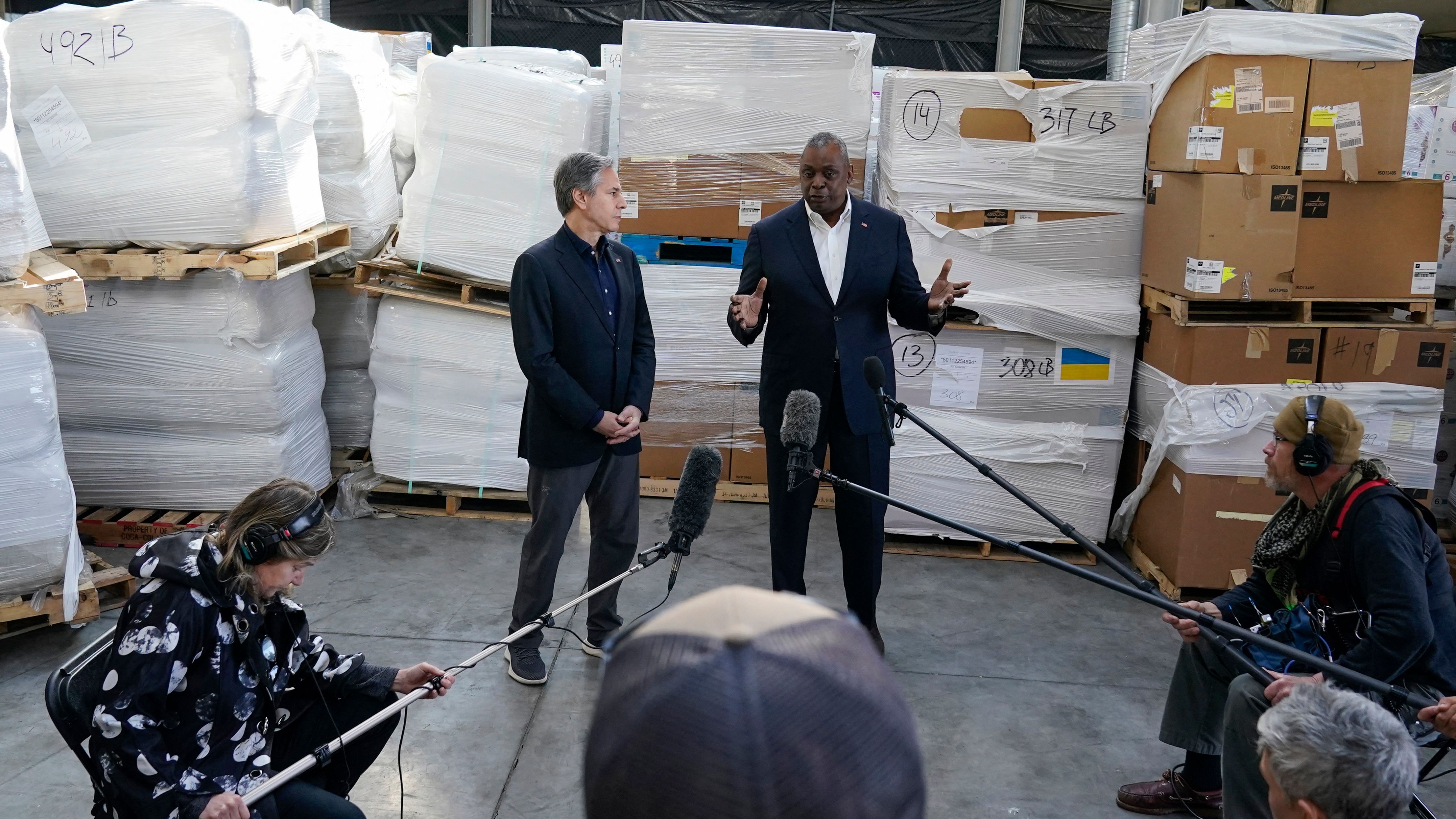Does the US believe Ukraine can beat Russia?
Visit to Kyiv by senior Biden officials hints at ‘new mindset’ in Washington

A free daily email with the biggest news stories of the day – and the best features from TheWeek.com
You are now subscribed
Your newsletter sign-up was successful
The US has pledged to reopen its embassy in Kyiv following a visit by Secretary of State Antony Blinken during which he said that Russia had “already failed” in its war aims.
Following talks with Ukraine’s President Volodymyr Zelenskyy, Blinken, flanked by US Defence Secretary Lloyd Austin, said that their ability to visit Kyiv “was proof of its tenacity in forcing Moscow to abandon an assault on the capital city last month”, Reuters reported.
The pair are “not the first to visit wartime Kyiv”, The Economist said, with Boris Johnson also travelling to the war-torn country to meet Zelenskyy earlier this month. But their “trip may be the most consequential yet” – and hints at “a new American mindset” over the war and its eventual outcome.
The Week
Escape your echo chamber. Get the facts behind the news, plus analysis from multiple perspectives.

Sign up for The Week's Free Newsletters
From our morning news briefing to a weekly Good News Newsletter, get the best of The Week delivered directly to your inbox.
From our morning news briefing to a weekly Good News Newsletter, get the best of The Week delivered directly to your inbox.
‘Final success’
Blinken and Austin used the meetings with Zelenskyy and his closest advisers to pledge $713m (£561m) in new military assistance for Ukraine and “other countries in the region seen as potentially vulnerable to Russian threats”, Reuters reported.
A US official told the news agency that the $322m (£261.8m) that was specifically for Ukraine would take the total US security assistance since the invasion began to $3.7bn (£2.9bn).
The officials, who crossed into Ukraine from Poland by train, also announced that the US intended “to resume diplomatic operations in Ukraine this week”, The Washington Post said. American diplomats left the country on 24 February, the day Russian troops began their invasion.
Addressing reporters after his visit, Blinken said: “In terms of Russia’s war aims, Russia has already failed and Ukraine has already succeeded.”
A free daily email with the biggest news stories of the day – and the best features from TheWeek.com
“Our support for Ukraine going forward will continue until we see final success,” he added. “We don’t know how the rest of this war will unfold, but we do know that a sovereign independent Ukraine will be around a lot longer than Putin is on the scene.”
Power play
The visit by two of the Joe Biden administration’s most senior officials “was a physical display of their belief in the country’s defences, which are now being tested anew in the east and south after holding firm against the Kremlin’s forces around Kyiv”, NBC said.
There was no walk around the streets of the capital, something Johnson was pictured doing in early April, with Blinken admitting later that “he and Austin weren’t able to visit much of Kyiv or speak to many people because of security concerns”.
But while “wartime anxiety lingers under the surface”, the broadcaster said, their decision to appear in the capital of the besieged nation represents a “return to some semblance of prewar life despite the lingering trauma – and threat – of Russian attacks”.
Unlike the visits by a string of European leaders in recent weeks, the US government was “at extraordinary pains” to keep everything about the trip “under wraps until the men were safely out of Ukraine”, The New York Times reported.

But the visit was “an open secret” – Zelenskyy inadvertently announced it to a room of journalists two days in advance – and served as a vindication from the White House of Ukraine’s “righteous use of force in self-defence”.
The decision to dispatch two cabinet members to Ukraine’s capital also hints that the US is developing a “clearer idea of its endgame in Ukraine”, The Economist said.
As Russian troops massed on Ukraine’s border, Washington’s “objective seemed limited to imposing costs” by handing “Ukraine some defensive weapons, and by placing sanctions on Russia”. But now that Ukraine has “demonstrated a remarkable ability to fight”, the White House seems to “be raising its ambition”.
Eventual winner
“We want to see Russia weakened to the degree that it can’t do the kinds of things that it has done in invading Ukraine,” Austin told reporters in Poland after the talks.
“It has already lost a lot of military capability, and a lot of its troops, quite frankly. And we want to see them not have the capability to very quickly reproduce that capability.”
The visit coincided with the US and its Western allies “delivering more offensive weapons” to Ukraine, “not just anti-tank weapons but now tanks and howitzers”, The Economist reported. Russia again responded with “shadowy warnings about its nuclear weapons”.
But the US increasingly seems “less worried about the risks” of backing Ukraine, the paper added. Instead, “America is embracing the idea that Ukraine might not only survive, but emerge victorious against Russia”.
No US official or cabinet minister is likely to go on the record as saying the White House believes in the possibility of a Ukrainian victory.
Austin did, however, come close to doing so when he said: “They [Ukraine] have the mindset that they want to win, we have the mindset that we want to help them win, and we are going to do that.”
-
 Political cartoons for February 21
Political cartoons for February 21Cartoons Saturday’s political cartoons include consequences, secrets, and more
-
 Crisis in Cuba: a ‘golden opportunity’ for Washington?
Crisis in Cuba: a ‘golden opportunity’ for Washington?Talking Point The Trump administration is applying the pressure, and with Latin America swinging to the right, Havana is becoming more ‘politically isolated’
-
 5 thoroughly redacted cartoons about Pam Bondi protecting predators
5 thoroughly redacted cartoons about Pam Bondi protecting predatorsCartoons Artists take on the real victim, types of protection, and more
-
 What would a UK deployment to Ukraine look like?
What would a UK deployment to Ukraine look like?Today's Big Question Security agreement commits British and French forces in event of ceasefire
-
 Would Europe defend Greenland from US aggression?
Would Europe defend Greenland from US aggression?Today’s Big Question ‘Mildness’ of EU pushback against Trump provocation ‘illustrates the bind Europe finds itself in’
-
 Is conscription the answer to Europe’s security woes?
Is conscription the answer to Europe’s security woes?Today's Big Question How best to boost troop numbers to deal with Russian threat is ‘prompting fierce and soul-searching debates’
-
 Trump peace deal: an offer Zelenskyy can’t refuse?
Trump peace deal: an offer Zelenskyy can’t refuse?Today’s Big Question ‘Unpalatable’ US plan may strengthen embattled Ukrainian president at home
-
 The Baltic ‘bog belt’ plan to protect Europe from Russia
The Baltic ‘bog belt’ plan to protect Europe from RussiaUnder the Radar Reviving lost wetland on Nato’s eastern flank would fuse ‘two European priorities that increasingly compete for attention and funding: defence and climate’
-
 How should Nato respond to Putin’s incursions?
How should Nato respond to Putin’s incursions?Today’s big question Russia has breached Nato airspace regularly this month, and nations are primed to respond
-
 What will bring Vladimir Putin to the negotiating table?
What will bring Vladimir Putin to the negotiating table?Today’s Big Question With diplomatic efforts stalling, the US and EU turn again to sanctions as Russian drone strikes on Poland risk dramatically escalating conflict
-
 The mission to demine Ukraine
The mission to demine UkraineThe Explainer An estimated quarter of the nation – an area the size of England – is contaminated with landmines and unexploded shells from the war